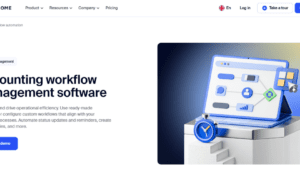Cloud computing solutions have taken the business world by storm, and the reasons why are immediately obvious. Storing software and data in the cloud means you’re no longer bound to a single physical device or network to access the information you need for work. Instead, you can perform your work anytime and anywhere, confident that your data is backed up online on a secure server.
Accounting is one major business function that has thrived over the years with the rise of cloud computing. Once dependent on manual labor and antiquated tools like physical record books, traditional accounting was a time-consuming, labor-intensive, and highly error-prone process for the most part. These days, modern accounting has become much faster, more flexible, and more accurate thanks to the availability of dedicated cloud-based accounting tools.
However, while cloud-based accounting programs doubtless offer many advantages, businesses seeking to implement them should also be aware that they come with certain inevitable risks and limitations. Understanding the pros and cons of using these solutions is critical to choosing accounting software Philippines businesses can rely on. This feature aims to explore both in detail so that companies can make more informed decisions before investing in new software.
Advantages of Cloud-Based Accounting Software
It’s not difficult to understand the popularity of cloud-based accounting solutions, as the many advantages they offer net businesses considerable efficiency and productivity gains. Here are some of the most compelling benefits:
Accessibility and Convenience
Possibly the biggest reason cloud accounting software has found such success in the business world is that it makes financial data accessible from any location and device with internet access. This means accounting teams no longer have to access company information and applications exclusively from dedicated work computers at a company’s physical workspace. They can instead work virtually anywhere—a game-changing factor in an increasingly mobile, digital-driven world.
Cloud-based accounting software also makes it easier for users to share data with their colleagues. It’s no longer necessary to email large files back and forth or pass them on in person through flash drives. Instead, accounting staff members can simply log on to the same system with their unique login credentials and they’ll be able to access all the information they need instantly.
Added Data Security
Data security is a paramount concern for any company, especially when it comes to financial data and other particularly sensitive information. A data breach can cost a company thousands of dollars in lost profits and also cause significant reputational damage. Companies will struggle to recoup these losses in the wake of a breach, and many small-to-medium enterprises with limited resources may never recover.
Fortunately, in many cases, storing information remotely on a secure server is safer than storing it on a physical device like a laptop or tablet. In the event that such devices are lost or stolen, system administrators can revoke those devices’ access to company systems remotely so that no data remains on them. Furthermore, using cloud accounting solutions protects financial data from other risks associated with local data storage, such as hardware failures and natural hazards like fires and floods.
On the digital front, the servers that cloud accounting solutions use to store company data are equipped with robust security protocols to deter hackers and other bad actors. The best accounting software will make extensive use of password protection, high-level encryption, permissions management tools, and other top-notch security tools to keep your information safe.
Cost-Effectivity
Companies that invest in cloud-based accounting solutions will immediately benefit from significant savings upfront. Infrastructure is one of the heaviest costs associated with data management and storage, and because cloud solutions store data remotely, these costs are minimal. Cloud-based accounting software also requires less in-house maintenance, as software providers typically take responsibility for maintaining and updating the software.
Limitations and Risks of Cloud-Based Accounting Software
Naturally, although cloud-based accounting software is undeniably powerful, it’s not a perfect solution. Companies who wish to migrate their accounting operations to the cloud would do well to be aware of the limitations of such software, such as:
Demand for Strong Cybersecurity Practices
A quality cloud accounting solution will employ best-in-class security protocols, but these also require considerable cybersecurity literacy from your team to work at their best. Human error remains one of the most common causes of digital data breaches, so it’s imperative that your team receives continual training in cybersecurity best practices. To start with, this entails teaching them the basics of digital hygiene, such as how to create a strong password, how to recognize hacking or phishing attempts, and other similar concerns.
Internet Access Requirement
Though internet-based data management and storage are highly convenient, your business may end up in a bind if your connection ever goes down. While your staff members can mitigate this problem by moving to another location with internet access, connection failures can still result in significant downtime. Cloud accounting solutions can also be extremely bandwidth-intensive, so you’ll have to invest in a strong connection that can handle high volumes of traffic daily.
Subscription-Based Payment Model
Cloud-based accounting software, like most other cloud computing tools, are not one-time license purchases. Instead, providers charge clients regular subscription fees for access to the system. While this cost is usually quite affordable, business owners must be prepared to account for it as part of their ongoing overheads.
At the end of the day, your company’s unique needs and the resources it currently has access to will determine whether or not cloud-based accounting software is a good fit for you. With the potential risks and benefits in mind, you’ll be well-equipped to make the most sensible choice possible for your business.



































